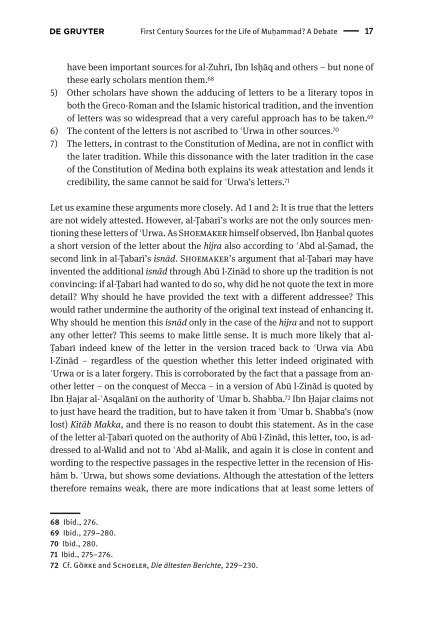0021-1818_islam_98-1-2-i-259
0021-1818_islam_98-1-2-i-259
0021-1818_islam_98-1-2-i-259
Create successful ePaper yourself
Turn your PDF publications into a flip-book with our unique Google optimized e-Paper software.
First Century Sources for the Life of Mu1ammad? A Debate 17<br />
have been important sources for al-Zuhr\, Ibn Is1aq and others – but none of<br />
these early scholars mention them. 68<br />
5) Other scholars have shown the adducing of letters to be a literary topos in<br />
both the Greco-Roman and the Islamic historical tradition, and the invention<br />
of letters was so widespread that a very careful approach has to be taken. 69<br />
6) The content of the letters is not ascribed to ^Urwa in other sources. 70<br />
7) The letters, in contrast to the Constitution of Medina, are not in conflict with<br />
the later tradition. While this dissonance with the later tradition in the case<br />
of the Constitution of Medina both explains its weak attestation and lends it<br />
credibility, the same cannot be said for ^Urwa’s letters. 71<br />
Let us examine these arguments more closely. Ad 1 and 2: It is true that the letters<br />
are not widely attested. However, al-Tabar\’s works are not the only sources mentioning<br />
these letters of ^Urwa. As Shoemaker himself observed, Ibn 0anbal quotes<br />
a short version of the letter about the hijra also according to ^Abd al-Samad, the<br />
second link in al-Tabar\’s isnad. Shoemaker’s argument that al-Tabar\ may have<br />
invented the additional isnad through Abu l-Zinad to shore up the tradition is not<br />
convincing: if al-Tabar\ had wanted to do so, why did he not quote the text in more<br />
detail? Why should he have provided the text with a different addressee? This<br />
would rather undermine the authority of the original text instead of enhancing it.<br />
Why should he mention this isnad only in the case of the hijra and not to support<br />
any other letter? This seems to make little sense. It is much more likely that al-<br />
Tabar\ indeed knew of the letter in the version traced back to ^Urwa via Abu<br />
l-Zinad – regardless of the question whether this letter indeed originated with<br />
^Urwa or is a later forgery. This is corroborated by the fact that a passage from another<br />
letter – on the conquest of Mecca – in a version of Abu l-Zinad is quoted by<br />
Ibn 0ajar al-^Asqalan\ on the authority of ^Umar b. Shabba. 72 Ibn 0ajar claims not<br />
to just have heard the tradition, but to have taken it from ^Umar b. Shabba’s (now<br />
lost) Kitab Makka, and there is no reason to doubt this statement. As in the case<br />
of the letter al-Tabar\ quoted on the authority of Abu l-Zinad, this letter, too, is addressed<br />
to al-Wal\d and not to ^Abd al-Malik, and again it is close in content and<br />
wording to the respective passages in the respective letter in the recension of Hisham<br />
b. ^Urwa, but shows some deviations. Although the attestation of the letters<br />
therefore remains weak, there are more indications that at least some letters of<br />
68 Ibid., 276.<br />
69 Ibid., 279–280.<br />
70 Ibid., 280.<br />
71 Ibid., 275–276.<br />
72 Cf. Görke and Schoeler, Die ältesten Berichte, 229–230.


